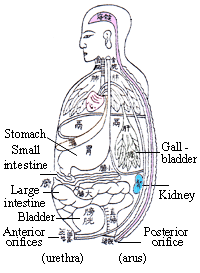How TCM Kidneys Affect The Fu-organs
 The kidneys rule water by regulating its distribution and excretion, traditionally described as vaporization by the kidney. The bladder stores and excretes urine, which is also part of the vaporizing process. From a TCM understanding, they do this through processes similar to opening and closing of different water gates. The propelling function of the kidney qi is crucial for normal bladder function. When the kidney qi is sufficient and its astringent function is proper, the bladder opens and closes regularly so as to maintain normal storage and excretion of urine. When there is a kidney qi deficiency, it leads to an irregular opening and closing of the bladder. Problems like general swelling (edema), incontinence and frequent urination will occur. Pathological changes in the storage and discharge of urine, therefore, are often related to both the bladder and the kidneys.
The kidneys rule water by regulating its distribution and excretion, traditionally described as vaporization by the kidney. The bladder stores and excretes urine, which is also part of the vaporizing process. From a TCM understanding, they do this through processes similar to opening and closing of different water gates. The propelling function of the kidney qi is crucial for normal bladder function. When the kidney qi is sufficient and its astringent function is proper, the bladder opens and closes regularly so as to maintain normal storage and excretion of urine. When there is a kidney qi deficiency, it leads to an irregular opening and closing of the bladder. Problems like general swelling (edema), incontinence and frequent urination will occur. Pathological changes in the storage and discharge of urine, therefore, are often related to both the bladder and the kidneys. Similarly, the propelling and warming functions of the kidneys ensure the normal actions of the following fu-organs:
- Receiving and ripening of food and fluids in the stomach;
- Containing and transforming food in the small intestine, this refers to receiving the semi-digested materials from the stomach that are further differentiated into nutrients and wastes;
- Transmitting the impure materials and stool excretion in the large intestine.
Generally speaking, the kidneys are the most important organs of the human body from a TCM viewpoint. They should be viewed as the congenital foundation and root of life. As we grow older, kidney function naturally declines. On a daily basis, it is essential to protecting, nurturing and consolidating the kidneys as they are fundamental to our long term health.
Written By:
Prof. Zhou Yanqin Affiliated Hospital of Nanjing TCM University
National Medical Center of TCM Kidney Disease
Editors:
Angela Collingwood, MSN, Integrated Chinese Medicine Holdings Ltd. Lawrence Lau, Ph.D., Integrated Chinese Medicine Holdings Ltd.
Rose Tse, Integrated Chinese Medicine Holdings Ltd.
Special thanks to Elpidio Talens Juan for helping with article graphics.


